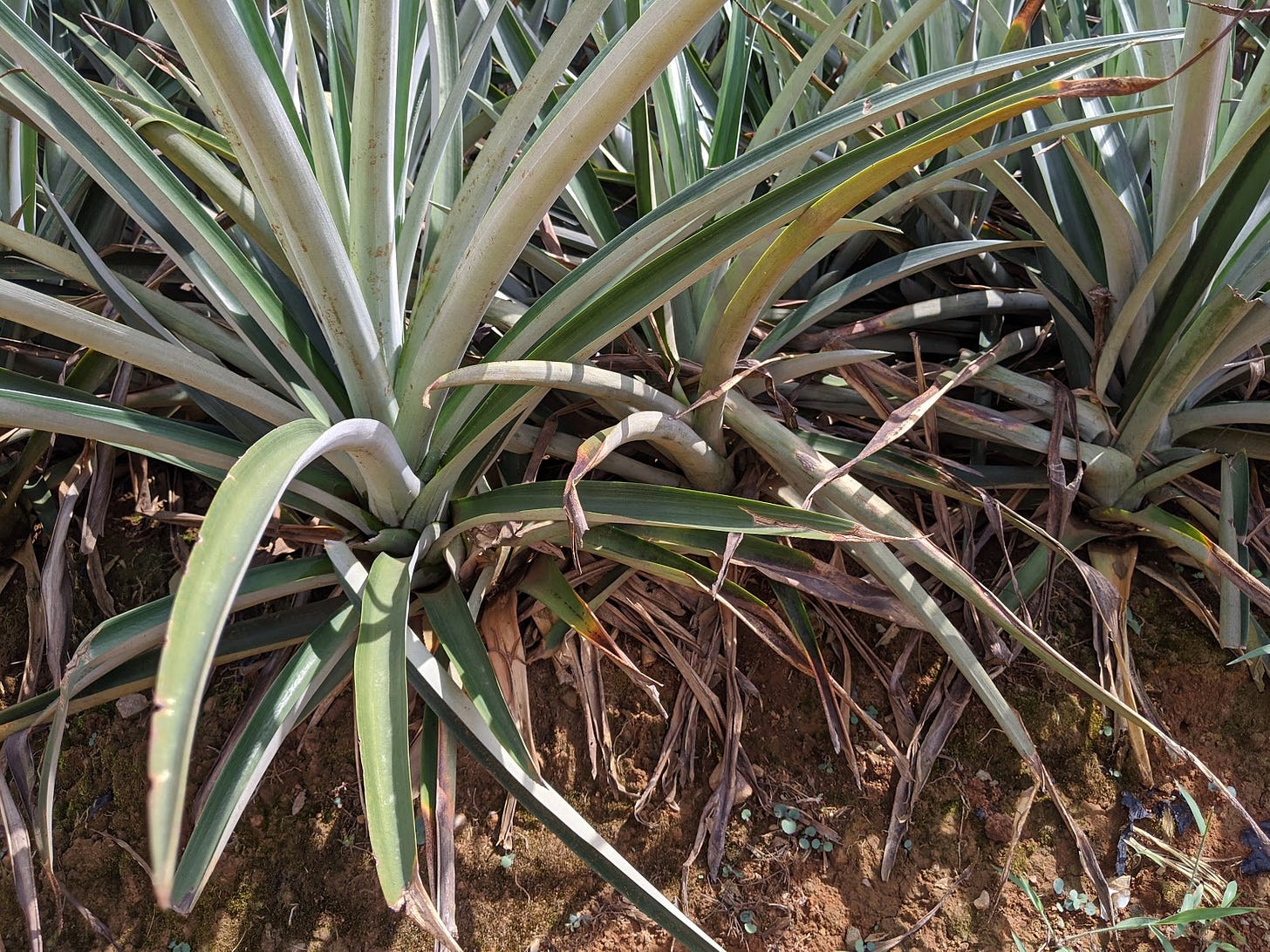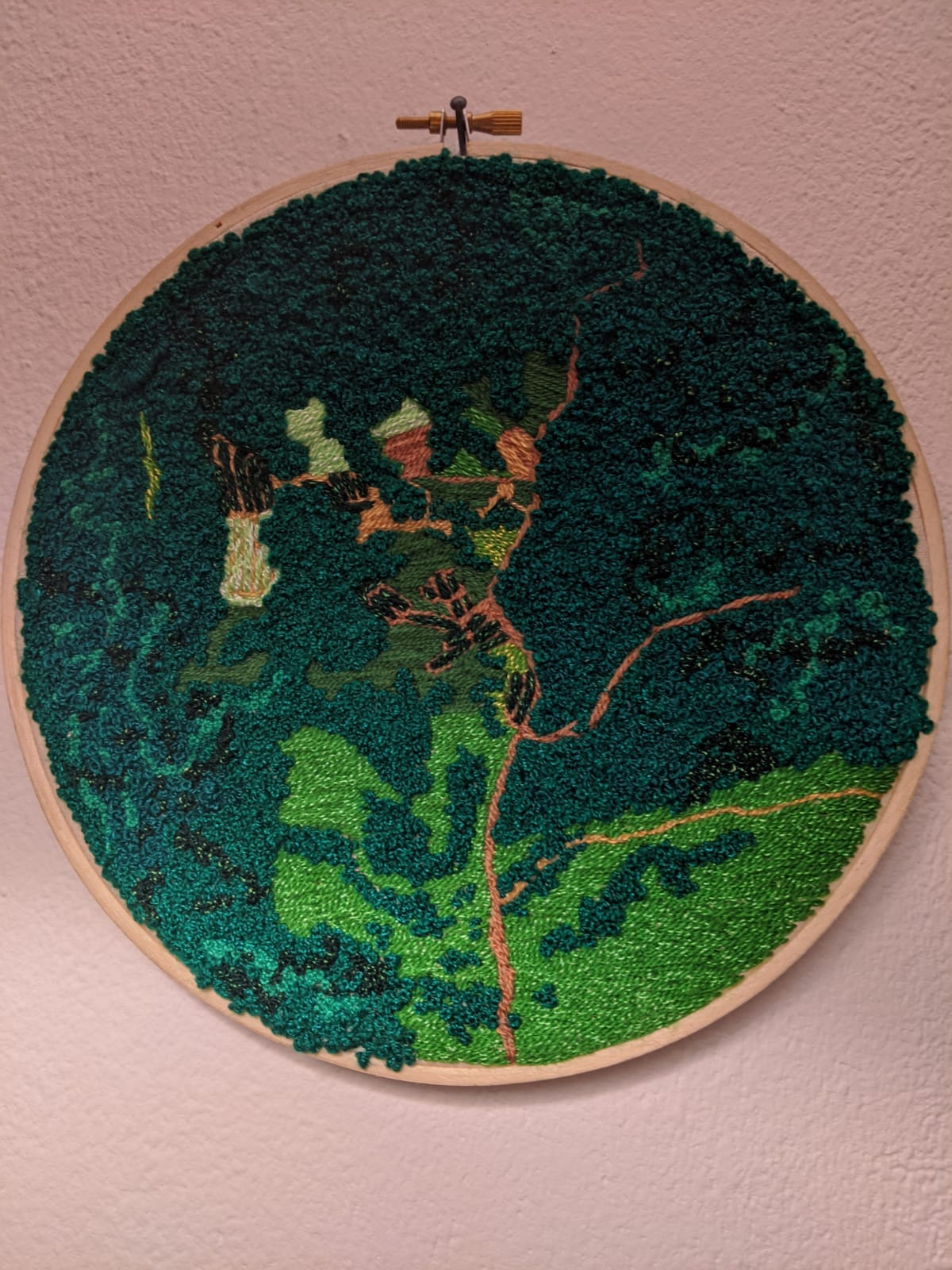Welcome to this latest edition of From a Climate Correspondent. If you'd like to support us, you can invite us for a coffee over at our Patreon page. We're grateful for any contributions!

A pineapple plantation in Costa Rica. Image credit: Jocelyn Timperley
Spotting a pineapple field along the side of the road on the way back from a trip months ago, we stopped for my friend to take some photos. For the first time, I took a good look at the spiny bases emerging from the earth.
The field was a vast expanse of these, planted in rows as far as I could see. Later on, pineapples begin to form from the plant’s flowers fusing together. Once grown, the pineapples perch upright rather cumbersomely in the middle of the mess of green spikes, looking as if they had been precariously balanced there by someone.
Costa Rica has grown to be the world’s biggest exporter of pineapples. But the industry has also accumulated a long list of serious accusations, from infringement on protected forests to contamination of local communities water supplies with toxic pesticides
This month, a photo emerged of workers at the firm ‘Pineapple of the Forest’ - a Dole subsidiary in the north of the country - huddled into a van as they headed to work in pineapple fields, seemingly with little protection, despite the area being in one of the hotspots of Covid-19 in Costa Rica. The company has also confirmed at least one case of the virus.
Concerns over the potential spread of coronavirus in the pineapple plantations has brought another issue with pineapple farms in the country to the fore: the hiring of undocumented workers under often poor labour conditions.
And some have begun to question whether pineapple cultivation as it stands really has a place in a country which prides itself on its ecological protection.
Pineapple incursion
Costa Rica’s pineapple sector has grown rapidly over the past decades as global demand for the sweet tropical fruit has surged. Exports increased by over 200% from 2000 to 2013, and now sit at around 2 million tonnes per year. Sales of banana and pineapple are now roughly equal, at just under $1bn each per year.
Underlying this huge expansion is an intensive pesticide regime that has helped make Costa Rica have the highest pesticide use per hectare of cropland of any country in the world.
“To produce the pineapple that you and I eat, you need a technological package that includes, for example, chemical substances prohibited in the European Union,” says Nicolas Boeglin, professor of public human rights in the law faculty at the University of Costa Rica.
The weedkiller paraquat, produced by Swiss agrochemicals giant Syngenta, is just one of these. “As of today no one has managed to explain to me what the magic is in Costa Rica that a product that is so harmful to soil that the European Union has banned it continues to be imported in large quantities by pineapple producers,” adds Boeglin.
Concerned communities living nearby pineapple fields say pesticides such as paraquat and the herbicide bromacil are polluting their drinking water.
Pesticide leakage is not the only ecological problem facing pineapple cultivation - its method of farming is also heavily criticised. “If you compare a banana field to a pineapple field, the banana field is practically a garden,” says Boeglin.
“Other plants grow, there are animals, there are certain insects. In the pineapple field you can see absolutely nothing but pineapple. [...] There is a constant erosion of the soils, and when that pineapple plantation is removed, what remains is a desert.”
This is a big problem, because pineapple plantations are expanding into previously more ecologically diverse land. Satellite images taken in 2017 showed 3,824 hectares within protected wild areas were planted with pineapple crops, as well as 16,385 hectares of wetland, according to Costa Rica’s 2019 State of the Nation report.
Urging action from the public and private sectors to address the situation, the report noted:
“The pineapple expansion in the country [...] has been related, in certain areas, with invasion of river banks, areas protected and sensitive ecosystems.”

The overlap between pineapple plantations and wetlands in Costa Rica in 2017. Source: Estado de la Nación, 2019/González, 2019b, with data from Prias-Cenat et al., 2019.
Another study in 2017 using satellite images found over 5,500 hectares of forest was illegally lost to make way for pineapple production between 2000 and 2015, largely in the northern part of the country.
Pineapple can also replace other kinds of land use which is not protected but still provides more biodiversity and climate benefit, says Eva Carazo, a researcher at the Universidad Estatal a Distancia who studies the health and environmental impacts of pineapple plantations on local communities.
“The three zones [where pineapple is produced in Costa Rica] are traditionally agricultural zones, above all of different food products, especially basics such as maize, beans, a little rice, vegetables, small peasant production which is also a very diverse production,” she says. “People have some products to sell in the market and also a variety of crops to feed the family.”
Carazo argues the growth of the pineapple industry is linked with a change in agricultural policy in the country towards attracting international investment and exporting food, in the hope of providing jobs. The problem, she adds, is that the jobs provided by the pineapple industry are poor quality, lacking in protective equipment, underpaid and often done by undocumented workes from Panama and Nicaragua who have little choice but to accept these conditions.
Worker power
The Covid-19 crisis has made these conditions more visible to a country often accused by campaigners of turning a blind eye to the pineapple industry. A scandal has been brewing for weeks due to concerns that undocumented workers are still arriving from Nicaragua - a country far harder hit than Costa Rica by the coronavirus - and bringing the virus with them.

Artist Claudia Campos Rodríguez made this embroidery of the growth of pineapple plantations into forest in the north of Costa Rica. You can see satellite images of the incursion here.
Carazo says plantation owners have failed to meet basic preventative conditions for preventing the spread of the virus, such as maintaining a physical distance between workers or providing masks when necessary. It’s a plausible claim, given the reports last month of several plantation owners previously hiding hundreds of undocumented workers as well as chemicals during visits audits from the Rainforest Alliance ethical certification scheme.
The absence of worker rights also has implications for the environment. Because plantations can be hard for outsiders to enter, many of the denouncements on illegal deforestation, planting in unauthorised areas, contamination or misuse of agrochemicals come from trade union members, says Carazo.
But worker organisations are strongly persecuted, she says, with workers that organise given the heaviest work in the worst conditions or finding themselves on black lists shared among plantation owners that stop them being employed on any of the farms.
“This is really serious because the syndicate is the mechanism that the workers have to defend their rights and denounce the way in which the companies are functioning,” she says.
A way out
The pineapple is originally from South America and was cultivated by the Mayas and the Aztecs, but the main variety known around the world today is the “Sweet Gold”, says Boeglin. Thanks to its genes and the chemicals used to cultivate it, this variety can arrive in London a month after being picked and still retain all its sweetness and colour, he says. Other varieties such as Cayenne struggle to compete.
Organic pineapples can be found in Costa Rica, but can’t survive the long journey as exports, adds Boeglin. “Exporting organic pineapple abroad is a challenge, but it could be tried,” he says. “The problem is that we have a state that is very happy with the conventional way of producing sweet gold pineapple.”
He argues the foreign trade ministry has never been concerned with finding economically profitable alternatives for small Costa Rican pineapple producers - those who believe in organic agriculture, but need a state company to help them place their products abroad.
Meanwhile, a group of communities impacted by pineapple plantations is calling for a moratorium on an expansion of the industry.
“We are not asking them to remove the plantations that are already there,” says Carazo. “What the moratorium asks for is that areas of pineapple cultivation are not extended or authorised until those that already exist are abiding by the laws that they should already be respecting.”
Must reads from the region
Rainforest Alliance certifying unethical pineapple farms, activists claim, Reena Shah, The Guardian Shah’s articles sets out the claims that Rainforest Alliance is licencing pineapple plantations with labour exploitation, use of illegal agrochemicals and the concealment of hundreds of undocumented worker when auditors come to visit.
It's Time for Environmental Studies to Own Up to Erasing Black People, Wanjiku Gatheru, Vice. “Mainstream environmental scholarship reflects the interests of the mostly white and wealthy—at the exclusion of the lived experiences of people of color and Indigenous folks,” writes Gatheru, a rhodes, truman & udall scholar. “I experienced this first hand as a student, the only Black person in my programs and clubs.”
Latinos must confront 'ingrained' anti-black racism amid George Floyd protests, some urge, Nicole Acevedo, NBC This piece looks at the call for Latinos to recognise racism in their histories, and not just as a US issue.Julio Ricardo Varela, founder of Futuro Media's Latino Rebels and a white-presenting Latino himself. "If you look at Latin America, in general, we literally carry around that baggage and bring that system with us.” There have also been protests in Latin America, including Costa Rica, in solidarity with Black Lives Matter protests in the US.
14 straight months of rising Amazon deforestation in Brazil, Rhett A. Butler, Mongabay Deforestation in the Brazilian Amazon is currently pacing 83% ahead of where it was a year ago.
What else I’m reading
El País de Las Mujeres (The country of women ) This original and imaginative book by Nicaraguan author Gioconda Belli lays out what happens when the all-female “Erotic Left party” enters government in the fictional country of Faguas and begins to implement the party’s progressive ideas.
Been forwarded this email?
Did someone send this on to you? Why not sign up yourself!
Who we are
Lou Del Bello is an energy and climate journalist based in Delhi, India.
Jocelyn Timperley is a freelance climate journalist based in San José, Costa Rica.
India Bourke is an environment journalist based in London, UK.
Mat Hope is investigative journalist based in Nairobi, Kenya.


